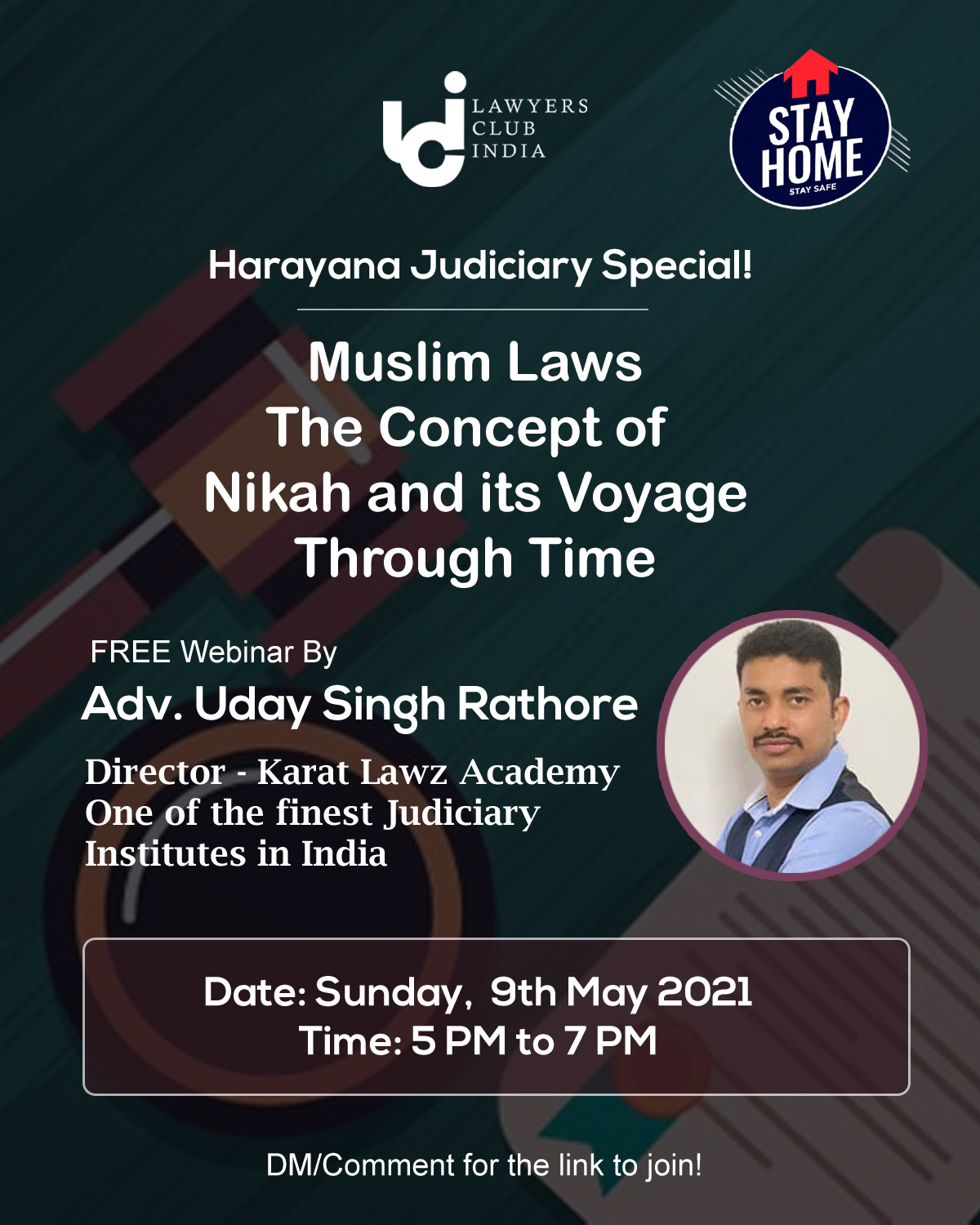Bench:
Justice A.S Anand, Justice K. Venkataswami
Appellant:
Noor Saba Khatoon & Others.
Respondent:
Mohd. Qasim
Date of Judgement:
29th July 1997
Issue
I) Whether Muslim children are entitled to maintenance under section 125 of Cr.PC?
Facts
- Noor Saba Khatoon married Mohammed Qasim on 27th October 1980 as per Muslim tradition. 3 children were born to them out of the said wedlock ( i.e. 2 daughters and a son)
- One fine day due to some matrimonial discord, Mohd. Qasim threw the appellant and their 3 kids out from the matrimonial home and thereby refused to maintain them.
- He later had a 2nd marriage with one Shahnawaz Begum. At that time his 3 children were aged 6 years, 3 years and an infant girl just aged 1 ½ yearrespectively.
- Noor SabaKhatoonfiled a petition on 13th February 1992 for maintenance for herself and on behalf of her children in the court of Judicial Magistrate 1st Class, Gopalganj.
- The respondent, Mohammed Qasimwent on to divorcehis 1st wife Noor Saba Khatoon justto modify the maintenance amount ordered by the trial court.
Appellant’s Contentions
- The appellant in her petition filed before the trial court pleaded for maintenance amount for herself and her 3 minor kids. She petitioned that each child should receive a monthly amount of Rupees 300 and also a monthly allowance of Rupees 400 for herself.
- She stated in her petition that her husband is a well off person who has farmland and also owns a business of electrical appliances. Whereas she has no means to maintain herself and their children and has no source of income.

Judgment
• Trial Court Verdict:
The Trial Court observed that the respondent neglected his duty to maintain his children and wife. Thus, on 19thJanuary 1993, The Judicial Magistrate ordered the maintenance amount to be paid to the wife at the rate of Rupees 200/- per month and to each of their children Rupees 150/- per month.
But after this order, Mohammed Qasim divorced his wife and asked the court to make changes in the maintenance amount as per section 3(1)(b) of the Muslim Women (Protection of Rights on Divorce) Act, 1986.
The Judicial Magistrate modified the order and held that the wife will get maintenance only up to the period of iddat and whereas with regards to the children the maintenance amount ordered under section 125 of Cr.PC shall not be affected In any manner by the 1986 Act.
• Revision Court Verdict
The respondent still was not satisfied by the order passed by the trial court and thus applied for revision but his application got dismissed by the 2nd additional judge.
• High Court Verdict
The respondent then went on to appeal in the High Court. The single-judge bench of the High Court held that under section 3(1)(b) of the Muslim Women (Protection of Rights on Divorce) Act, 1986a woman can seek maintenance for her children for 2 years from the date of birth.
Accordingly, the High Court ordered that only the infant girl aged 1 ½ year was eligible to get maintenance until she attains the age of 2 years and hence, the other 2 children were held ineligible to receive any maintenance. Furthermore, the Court said that the children cannot claim maintenance under section 125 of Cr.PC.
• Supreme Court Verdict:
The appellant-mother filed an appeal in the Supreme Court of India against the impugned order by way of a special leave petition. The Supreme Court found an error in the judgement passed by the High Court and remarked that the order passed by the concerned High Court was misleading and improper. Thus, the order of the High Court was set aside and held the judgement passed by the trial judge and revision court judge to be correct.
The apex court observed that the provision under section 3(1)(b) of the 1986 Act allows additional maintenance to a mother to maintain the child for the fosterage period of 2 years from the date of birth of the infant. This section shall not override the provisions of section 125 of the Cr.PC that allows minor children to claim maintenance.
The rights of minor children unable to maintain themselves shall not be affected by section 3(1)(b) of the Act. Every Muslim child who is below the age of 18 years can obtain maintenance by invoking section 125 of the code in cases where the parents neglect or refuse to maintain.
The Court held that section 125 of the Criminal Procedure Codeputsan obligation upon the father to maintain their children. Thus, the father was held liable to pay the maintenance amount to his children.
The apex court ordered Mohammed Qasim to pay the arrears of maintenance within 1 year from the date of this judgement in 4 equal quarterly instalments to the mother of his 3 children who had filed a petition on their behalf. Lastly, the Court said that the maintenance has to be paid till the children attain majority (i.e. 18 years of age) and in the case of daughters until they are married.
Relevant Paragraphs
Given the provisions of section 3(1)(b) and a plain reading suggest that the ‘Mahr’ is to be paid at the time of divorce. Also, this section makes provisions for maintenance till the fosterage period i.e. 2 years from the date of birth of the infant. Even a provision is made in the section for a divorced Muslim woman that allows her to obtain maintenance from her husband during the period of iddat.
With regards to children, the right to claim maintenance under section 125 of the Cr.PC is different, independent and separate from the right of divorced women. Both the Muslim personal law as well as the statutory law requires a father to maintain his children. Section 3(1)(b) does not intend to take away the rights of Muslim children who claim maintenance under section 125 of the code.
Click here to download the original copy of the judgement










